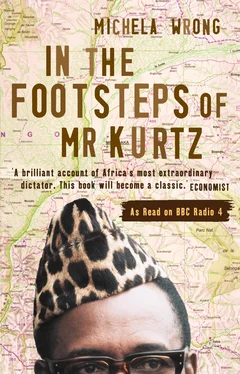The Hotel Intercontinental manager was finding the experience as claustrophobic as the rest of us. His appearance was as natty as ever, but his face was beginning to show the strain. ‘How much longer is this going to go on? I can’t eat, I can’t sleep. It’s giving me ulcers,’ he confessed over breakfast. Fearing a siege, he had stockpiled enough food, water and diesel to cater for 2,000 people for at least a fortnight. Now he chose to combat the tension the only way he knew how: by entertaining in style. Select, candle-lit dinners were staged in the wine cellars of the hotel. Surrounded by dusty vintages, nestling in the bowels of the building, for one brief night we felt sheltered from the approaching storm.
‘Do you really think these Tutsi troops are going to be as effective as people say?’ asked my neighbour as we savoured the nouvelle cuisine. ‘I suspect it’s all a myth. It’s easy enough beating the Zairean army out in the sticks. But surely when the rebels get to Kinshasa, and the DSP have nowhere left to run, it’ll be completely different?’
It was a view I heard repeatedly, but not one I shared. I had no expectations the DSP would ever do battle. What I feared was that they would go for the soft targets, like journalists. I had developed a habit of shouting in my sleep and regretted now checking into the sixteenth floor. A precise image haunted me: looking through the spyhole in my door and seeing two DSP men, guns cocked, about to break into the room and toss me out of the window. Even if I hit the main building on the trip down, there was no way I could survive the fall from that height.
Radio Trottoir, ‘pavement radio’, as the city’s gossip network was known, was in overdrive. There were rumours of Chinese mercenaries landing in their hundreds, of Zulu troops being called in from South Africa, of goose-stepping soldiers coming in from North Korea to save Mobutu. Also circulating were leaflets telling residents who wanted change to tie white bandanas around their foreheads when the rebels arrived as a sign of support. On the main routes into town, tanks and artillery had been set up. But with each soldier convinced a rival unit was bent on treachery, they were too busy watching each other to stop the steady flow of infiltrators into Kinshasa.
Given the steady ratcheting of tension, it was no surprise that on 15 May anyone who owned a television sat glued to their set. Since mid-afternoon a message had been running across the screen, promising an important press conference. The word on Radio Trottoir was that Mobutu had been meeting with his generals and his departure was about to be announced.
The hours ticked by and nothing happened. The message continued to unroll. Finally, after midnight, a nervous newscaster appeared. To a rapt audience he read out a bland summary of the day’s events, rounded off with a piece of homely advice: viewers should watch out for the small beetles emerging after the recent seasonal rains, which packed a particularly nasty bite.
Whatever talks had taken place in Zaire’s upper echelons, commonsense had not triumphed. Mobutu, who had always warned his countrymen that ‘ma tête vaut cher’ (‘my head won’t come cheap’) could not let go. When he drove to the airport the following day, heading for the jungle palace where, it was said, he planned to exhume his ancestor’s bodies to save them from desecration by the rebels, he stole away in silence, having taken none of the hard decisions demanded.
And so it was that six hours after the death squad’s first unwelcome visit to the Intercontinental, I found myself peering over the balcony, watching as the parking lot below filled with gleaming jeeps and flashy sports cars. Kongulu and his men were back, and this time they had arrived in force.
The lifts filled with panicking women, their hair in a mess, juggling sleepy children in pyjamas, bulging holdalls and plastic bags full of documents. Not only had we been sleeping alongside the regime’s fifth columnists for the last few days, it emerged, we’d been unwitting neighbours of the DSP chiefs’ extended families.
I could see their menfolk patrolling nervously up and down, toting sub-machine guns and draped in cartridge belts. They were wearing their trademark sunglasses, those gold-rimmed feminine accessories which should look comic on a man but instead manage to look as sinister as the wedding dresses and blonde wigs worn by Liberia’s drugged fighters. They are the modern equivalent of the wooden masks donned around night fires by warriors preparing to do battle, which turn their wearers into something utterly alien – faceless instruments of violence capable of unspeakable acts.
We had chosen the Intercontinental because of its track record of safety. But in a shifting world order, yesterday’s guardians could turn into today’s hostage-takers. Looming all too vividly now was the possibility that the DSP might choose to make its last stand at Mobutu’s hotel. Did our nosy room cleaner and nervous taxi driver, neither of whom had made an appearance that day, know something we didn’t?
I called the British head of a security company downtown. ‘Just let us know if you get too concerned and we’ll come and get you,’ he said breezily, as though it was the easiest thing in the world. But word came that a camera crew trying to leave the hotel had been roughed up by the DSP and turned back. Summoning assistance might simply precipitate a crisis. More hopeful news came from journalists trapped at the Hotel Memling, that other de facto media headquarters in the centre of town. Closer to the action, they were watching retreating Zairean soldiers streaming along the boulevards, a retreat turning into a rout. As they surrendered ground, the men were removing their uniforms to emerge as harmless civilians.
Down in the lobby, a similar remarkable metamorphosis had taken place, almost without our noticing. Uniforms and weapons had all disappeared. Scores of muscular young men were lounging about in modish tracksuits, not a hint of camouflage or khaki in sight. The Hotel Intercontinental suddenly appeared to be hosting a well-attended sports convention.
The truth dawned: the Intercontinental was not going to be the stage for a new Alamo. The DSP had laid their plans in advance and were using the hotel as a way station where they could round up their families and change into civilian clothing before heading for the river. From cursing the inaction of the Western force in Brazzaville, we went to praying they would keep away. The last thing we needed now was for the DSP’s exit to be blocked.
Indeed, the DSP were encountering something of a logistical problem, as the first to flee had left their boats on the wrong side of the river. And this was when the Hotel Intercontinental suddenly justified its outrageously inflated prices, making up for all the suspect salads and blue feet, the years of skittering cockroaches and terrible muzak. From his office, our hotel manager called up his Lebanese friends and explained the situation. Swiftly a small fleet of Lebanese-owned motor-launches was assembled to ferry the new-found sports enthusiasts and their families across to Congo-Brazzaville. One convoy after another headed out, the limping wounded bringing up the rear. The hotel miraculously emptied and we heaved a sigh of relief. A showdown that could have cost hundreds of lives had been averted.
Across the deserted city, the Western security experts were at their work. On one street corner, a Belgian sharp-shooter took careful aim as a colleague ushered out a group of terrified nuns. Roaring around Kinshasa in a UN jeep, another leathery veteran had set himself the task of persuading what few soldiers remained to disarm. In the patronising tones you might use with a naughty toddler, he was telling teenagers so drunk they could barely focus to drop their rocket-grenade launchers before they did themselves a mischief.
Читать дальше












